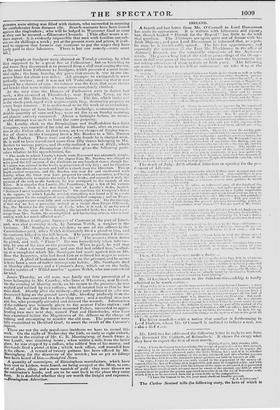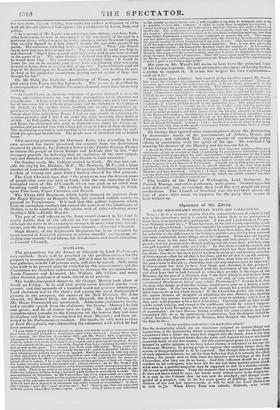Mr. Littictnn has addressed the following letter in reply to
ore from the Reverend Mr. Cabbett, of KiIn,a1lock. It shows the clergy what they have to expect the first of next month,
"Dula in Castle, 14th October 1834. " Si a -•I have the humor to ae...nowletlge the receipt of your totter of the loth instant, requesting 10 he iiitiototell whet boor it is the intention of SillVewhIllt•Ut to require the repaymen... or the money advanced under the l'ithe Million Act ; anil, if it is, whether you are to be furnished with returns of the money advanced, and obto whether you GU reenter the first fifth from the landlords whose grounds tore held by tenants at will. " lu reply, I have to acquaint you, with regattl to the repayment of the money ad• toured, that the Act tor Parliament is imperative, and must be complied with; and with respect to your beinz furnished with the returus of the snots so advanced, it is presumed those who have received such advance must be aware of the amount, one fifth of which autumn most be paid to the person appointed to receive it on the 1st of November next, which filth is to Ix ream ered from the person liable to the composition.
" 1 have the honour to be, Sir. your most obedient humble servant,
" E..I. LITTLE row" The Carlow Sentinel tells the following story, the hero of which is
the notorious Parson %I bitty, who could not collect a sixpence of tithe with all the aid afforded him against his parishoners by horse, foot, and police.
" As a servant of Mr. Lawler was a few days since driving a car from Rath-
villey de, he was, iu consequence of the narrowness of the road at a particular place, obliged to pass by, rather closely, a certain Reverend Captain, who recently figured in a holy crusa.'e against the autiotithe-payers of his parish. his reverence, with fury in hi; 1 e0., CYCLIIII1011, What ! you Popish rascal, how dare you drive so near me ?' The man said he could not help it, and observed, Sure I have as much right to pass the road as you have to stand in the centre of it.' The other thercup■at declared that if he was impertinent he would shoot him. '1'lle emmtryman reohed, rather drily, It would be better for you to be minding, your your;; wife, not knowing what was going forward at home, than attempting that, at any rate.' Upon which the good old Clays of 'DS flashed upon the Reverend Captain's 'Mud ; and levelling his gun, he fired at his astonished countryman, putting several grains of large shot through his hat!"
Dr. Mc Hale, the Catholic Archbishop of Timm, made a trium- phal entry into Tuam one day last week. The scene, as described by a correspondent of the Dublin Freeman's Journal, must have been very
iking.
" At Castle Grove, an immense concourse of persons thronged to meet his Grace, and conduct him to the seat of the mettopolitan sec in splendour and onaAnificence. A large train of carriages, gigs, jaunting-cars, and a vast num- ber of hot seinen, fell m with the procession ; and the students of the College of St. Jerlath, to the number of one hundred and twenty, in academies, ap- proached to receive his Grace's episcopal benediction. At Kilbantion, which is distaut about three miles front Team, I had an opportunity of estimating the numbers present ; and I fear I am under the stark in setting them down at 40,000. At Hallygaddy, the river of which divides the parishes of Kilbannon and Tuam, the clergymen who acted as administrators under his Grace, aps !mulched and presented him with a large gilt cross, in token of their obedience. lite Archbishop received it, and standing in his carriage, imparted to the mul- titude his episcopal benediction. The people were all uncovered and on bendeul That amusing personage Sir Harcourt Lees, ivlio according to his own account has twice preserved the country from the destruction menaced by plotters, has written a letter to the Dublin Evening Packet, to inform the people of Great Britain and Ireland, that he has " the strongest grounds for believing that an explosion of the most sangui- nary and diabolical character is not far distant in both countries."
On Sunday week, Mr. Cobbett arrived in Cork. Ile was met out- side the city by Dr. Baldwin, M. P., Mr. Ronayne, M. P., end a large number of respectable individuals. On passing Sallybrook, he received
a salute of twenty-one guns from a battery erected for that purpose. The Cork Chronicle says, that "the procession was the densest mass of people that ever was seen in Cork, with the one exception of the
triumphal entry of Mr. O'Connell, which was puch as no other man breathing could expect." Mr. Cobbett has been lecturing, in Cork, upon Poor-laws, Paper Currency, and Repeal.
The Thirty-fifth Regiment, which lately changed its quarters from the Royal Barracks to Beggar's Bush, has received sudden orders to proceed to Templemore. It is said that this gallant regiment, which from its exemplary conduct had earned the esteem of the inhabitants of Dublin, is to be employed in the odious task of tithe-collecting under Stanley's Bill.—Dublin Register.
The pay of staff officers on the Army establishment in Ensland is nearly double that of the officers on the same service in Ireland ; although the force in this country is stronger, in more numerous detach- ments, and the duty consequently more onerous.—Linicrick Chronicle. Hugh Beatty, of the Eighteenth Regiment, has been sentenced by court-martial in Limerick garrison to twelve months' conlinement, in- cluding nine months' hard labour, for drunkenness and insubordination.
—Limerick Chronicle.



















 Previous page
Previous page